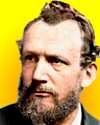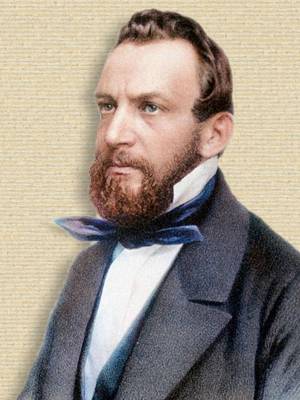 (source)
(source)
|
Emil DuBois-Reymond
(7 Nov 1818 - 26 Dec 1896)
German physiologist whose research on animal electricity in nerve and muscle fibers founded modern electrophysiology. In 1849, he detected minute electrical discharges created by the contraction of the muscles in his arms.
|
Science Quotes by Emil DuBois-Reymond (3 quotes)
Every ambitious scholar, especially one who has already attained achievements equal to yours, is Humboldt’s son; we are all his family.
— Emil DuBois-Reymond
In Letter to Carl Ludwig (26 Jun 1849), quoted in Archiv für Kulturgeschichte (1959), 41, 178, footnote 36, as translated using Google from the original German, “Jeder strebsamec Gelehrte, um so mehr einer, der schon Leistungen hinter sich hat, gleich den Deinigen, ist Humboldt’s Sohn; wir alle sind seine Familie.” Also seen translated as “Every industrious and ambitious man of science, all the more so one who already has achievements like yours behind him, is Humboldt’s son; we all are his family”, in Galina Kichigina, The Imperial Laboratory: Experimental Physiology and Clinical Medicine in Post-Crimean Russia (2009), 64. Also seen paraphrased elsewhere, for example, as “Every scientist is a descendant of Humboldt. We are all his family”, in Laura Dassow Walls, The Passage to Cosmos: Alexander von Humboldt and the Shaping of America (2009), ix. The original letters exchanged by DuBois-Reymond and Ludwig are well documented.
Fundamentally, as is readily seen, there exists neither force nor matter. Both are abstractions of things, such as they are, looked at from different standpoints. They complete and presuppose each other. Isolated they are meaningless. … Matter is not a go-cart, to and from which force, like a horse, can be now harnessed, now loosed. A particle of iron is and remains exactly the same thing, whether it shoot through space as a meteoric stone, dash along on the tire of an engine-wheel, or roll in a blood-corpuscle through the veins of a poet. … Its properties are eternal, unchangeable, untransferable.
— Emil DuBois-Reymond
From the original German text in 'Über die Lebenskraft', Preface to Untersuchungen über tierische Elektrizität (1848), xliii. As translated in Ludwig Büchner, Force and Matter: Or, Principles of the Natural Order of the Universe (1891), 1.
The history of science is the real history of mankind.
— Emil DuBois-Reymond
As given, without source citation, as an epigraph opening W.T. Sedgwick, and H.W. Tyler, A Short History of Science (1917), ii. The quote is no doubt a translation from an original in German, which Webmaster has not yet been able to track down.
See also:
- 7 Nov - short biography, births, deaths and events on date of DuBois-Reymond's birth.

 In science it often happens that scientists say, 'You know that's a really good argument; my position is mistaken,' and then they would actually change their minds and you never hear that old view from them again. They really do it. It doesn't happen as often as it should, because scientists are human and change is sometimes painful. But it happens every day. I cannot recall the last time something like that happened in politics or religion.
(1987) --
In science it often happens that scientists say, 'You know that's a really good argument; my position is mistaken,' and then they would actually change their minds and you never hear that old view from them again. They really do it. It doesn't happen as often as it should, because scientists are human and change is sometimes painful. But it happens every day. I cannot recall the last time something like that happened in politics or religion.
(1987) -- 


